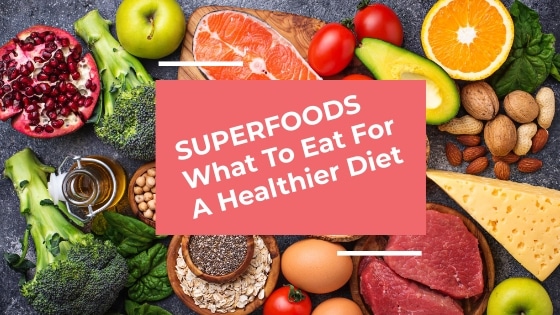
Superfoods: What To Eat For A Healthier Diet
Superfoods: What To Eat For A Healthier Diet
There is no one specific food that can automatically lead you to a healthier diet, but knowing the healthiest foods to eat may just help you with that. Superfoods are foods with nutritional compositions ideal for the human body to function properly. Studies suggest that superfoods are not only highly nutritious due to a high concentration of nutrients but also are of biological value because of their availability and activities within the body.
Over the years, research has shown that healthy dietary patterns can reduce risk of hypertension, cardiovascular diseases, diabetes, and certain cancers. These superfoods offer the important nutrients that can enhance your meal preparations, and further help you improve a healthier eating pattern. Below is the list of Superfoods that you should include in your next meal.
Berries
Berries are high in fiber, are mostly sweet, high in antioxidants, and contain disease-fighting nutrients. The higher levels of flavonoids in berries have been shown to lower the risk of cardiovascular diseases. Some of the identified superfood berries include acai berries, blueberries, raspberries, and goji berries. Add them in your diet: Add to yogurt (you can use frozen berries too), cereals, and smoothies, or eat it plain as a snack.
Fish
Fish is a good source of protein and omega-3 fatty acids. Omega-3 is known to prevent heart disease. Fatty fishes like salmon, trout and herring can decrease the risk of cardiovascular diseases, and reduce cholesterol. Add them in your diet: Buy fresh and/or frozen fishes. Other fatty fishes with the high omega-3 content are tuna steaks, mackerel, anchovies, and sardines.
Green and leafy veggies
Leafy vegetables are known to be good sources of vitamin A, C, E and B. They are abundant in carotenoids, iron, magnesium, potassium, and calcium. To add, leafy vegetables are good sources of fiber that can alleviate constipation and can enhance digestion. Examples of these vegetables kale, spinach, Swiss chard, beet greens, and collard greens as superfood leafy greens. Add them in your diet: Saute these in olive oil and/or mix them into salads. You can also add these greens to soups and stews. One study shows that a cup of kale provides 550 micrograms of vitamin K which meets a person’s daily needs.
Cruciferous vegetables
Cruciferous vegetables or those veggies coming from the cabbage family includes broccoli, Brussels sprouts, cabbage itself, cauliflower, radishes, and turnips. These are great sources of fiber, vitamins, and phytochemicals including indoles, thiocyanates, and nitriles, which may prevent some types of cancer. According to the Journal of the American Dietetic Association in 1996, cruciferous vegetables can protect people from cancer as they seem to stop the growth of cancer cells. Add them in your diet: Try stir-fried vegetables, add healthy oils (i.e. olive oil), herbs and other seasonings for flavor.
Nuts
Nuts are good sources of protein. They also contain unsaturated fats, which may reduce the risk of heart disease. Some examples of these are hazelnuts, walnuts, almonds, pecans. Add them in your diet: Put a handful to overnight oats and yogurt, or have it as a snack. Try the various types of nut butter like almonds and cashews. Nuts also complement veggies and salads.
Olive oil
Olive oil is a great source of polyphenols, vitamin E, and healthy monounsaturated fatty acids; and can reduce the risk of heart diseases. It is also anti-inflammatory. Healthy fats in olive oil can also promote good cholesterol and help in the regulation of blood sugar. Add them in your diet: There are various types of olive oil – Extra-virgin olive oil, virgin olive oil, regular or pure olive oil, and light olive oil – they vary in acidity, and price. Make sure to get the one fit for your needs. Use them in exchange for butter or margarine in pasta or rice dishes. Saute vegetables using olive oil.
Whole grains
Whole grains are sources of both soluble and insoluble fiber, they also contain several B vitamins, minerals, and phytonutrients (substances found in plants that are beneficial to human health). They also reduce cholesterol levels and protect oneself against heart diseases, as well as diabetes. Examples of whole grains are barley, quinoa, brown rice buckwheat, oatmeal, and whole-wheat bread, pasta or crackers. Add them in your diet: Try having a bowl of oatmeal for breakfast. Oatmeal is one of the easiest whole grains to buy in the market as they are readily available. You can eat them cold or hot depending on your preference. Substitute quinoa or brown rice for your usual steamed rice or mashed potato.
Yogurt
Calcium and protein can be sourced from yogurt. It also contains live cultures called probiotics. Probiotics are good bacteria that can protect the body from other, more harmful bacteria. Add them in your diet: Try eating plain yogurt rather than other flavored fruit yogurts as they contain added sugar. Should you want a fruity snack, you can purchase plain yogurt and just add your own fruit. You can also use yogurt in exchange of mayonnaise or sour cream in dips or sauces.
Legumes (or Pulses)
This category includes kidney, black, red, and garbanzo beans, as well as soybeans and peas. Legumes are excellent sources of fiber, and plant-based protein. Studies show they can help reduce the risk of heart disease. Research indicates that they offer health benefits such as improved type 2 diabetes management, and reduced blood pressure and cholesterol. Eating legumes regularly also promotes healthy weight maintenance, as they improve feelings of fullness. Add them in your diet: You may add legumes to salads, soups, and casseroles.
Tomatoes
Tomatoes are advertised as containing lycopene, but they are also sources of vitamin C. Add them in your diet: Since tomatoes are already one of the most consumed vegetables, you may already know a lot of recipes that include tomatoes. If you have not yet, try tomatoes in a salad or as a tomato sauce over your pasta. You can also put them in stews, soups, or chili. Lycopene becomes more available for your body to use when tomatoes are prepared and heated in a healthy fat such as olive oil.
Now that you know some of the superfoods, it is high time for you to include them in your diet. It is true that one of these cannot automatically make you healthy, but adding and mixing these into your diet may. Stay healthy! Stay super with superfoods.
References:
- Devalaraja S., Jain S., Yadav H. Exotic fruits as therapeutic complements for diabetes, obesity and metabolic syndrome. Food Res Int. 2011;44: 1856-1865.
- McManus Katherine D. , MS, RD, LDN, 10 Superfoods to boost a healthy diet. Harvard Health Publishing. 2018.
- Barrett, J. R. (2006, June). The science of soy: What do we really know? Environmental Health Perspectives, 114(6), A352-A358
- Lobo, V., Patil, A., Phatak, A., & Chandra, N. (2010 July-December). Free radicals, antioxidants and functional foods: Impact on human health. Pharmacognosy Review, 4(8), 118-126
- Yao L. H., Jiang, Y. M., Shi, J., Tomás-Barberán, F. A., Datta, N., Singanusong, R., & Chen, S. S. (2004). Flavonoids in food and their health benefits [Abstract]. Plant Food Human Nutrition, 59(3), 113-22
- Yoto, A., Murao, S., Nakamura, Y., & Yokogoshi, H. (2014). Intake of green tea inhibited increase of salivary chromogranin A after mental task stress loads. Journal of Physiological Anthropology, 2014(33), 20
- Mudryj AN1, Yu N, Aukema HM. Nutritional and health benefits of pulses. https://www.ncbi.nlm.nih.gov/pubmed/25061763
- Rani Polak,1 Edward M. Phillips,1 and Amy Campbell. Legumes: Health Benefits and Culinary Approaches to Increase Intake. https://www.ncbi.nlm.nih.gov/pmc/articles/PMC4608274/
- Edith, Jen. Tomatoes: Benefits of this Common Superfood (with Recipes! https://www.onegreenplanet.org/vegan-food/tomatoes-benefits-of-this-common-superfood-with-recipes/
- Ansley Hill, RD, LD. 16 Superfoods That Are Worthy of the Title. https://www.healthline.com/nutrition/true-superfoods
- Natalie Olsen, R.D., L.D., ACSM EP-C. What are superfoods and why should you eat them? https://www.medicalnewstoday.com/articles/303079

